Arthritis Treatment
Arthritis, a condition characterized by joint inflammation and pain, affects millions worldwide and can significantly impact daily life. Ayurveda, an ancient Indian medical science, offers a natural approach to managing arthritis by addressing its root causes and providing holistic treatments tailored to each individual’s unique body constitution, or dosha. Ayurveda sees arthritis not just as a physical ailment but as an imbalance in the body’s energies, primarily Vata, which governs movement and flexibility. By balancing these energies and detoxifying the body, Ayurveda aims to alleviate pain, improve joint function, and support long-term relief.

Ayurvedic arthritis treatment seeks to balance the aggravated doshas, reduce inflammation, detoxify the body, and promote overall joint health.
Ayurvedic Treatments for Arthritis
Ayurveda employs a combination of dietary, herbal, and lifestyle interventions, alongside therapeutic practices, to treat arthritis. Here are some of the primary methods used:
Herbal Remedies
Ayurveda offers a range of herbs to reduce inflammation, relieve pain, and support joint health.
Panchakarma Therapy
Panchakarma is a unique Ayurvedic detoxification and purification process that aims to remove ama (toxins) from the body, which often accumulates in the joints and aggravates arthritis.
Diet
Foods like ginger, garlic, turmeric, and warm spices help reduce inflammation and improve digestion. Avoiding foods that produce ama, such as heavy, oily, and processed foods, is crucial.
Exercise and Yoga
Gentle yoga poses, such as Cat-Cow and Warrior poses, help improve joint flexibility and reduce stiffness. Light, regular exercise is encouraged to maintain mobility without straining the joints.


Holistic Approach to Arthritis Management
In addition to the above treatments, Ayurveda emphasizes the importance of mental and emotional well-being in managing arthritis. Practices like meditation, breathing exercises (pranayama), and mindfulness are recommended to reduce stress, which can exacerbate pain and inflammation. Ayurveda’s holistic approach considers the mind, body, and spirit, aiming to restore balance across all aspects of life.
Osteoarthritis (Sandhivata) – Linked primarily to Vata imbalance, this type is common in older adults and is characterized by joint stiffness, pain, and reduced flexibility.
Rheumatoid Arthritis (Amavata) – Often associated with an imbalance of both Vata and Kapha, this type involves swelling, pain, and inflammation in the joints due to toxin accumulation (ama).
Gout (Vatarakta) – This type involves both Vata and Pitta imbalances, with symptoms like joint redness, intense pain, and inflammation.


